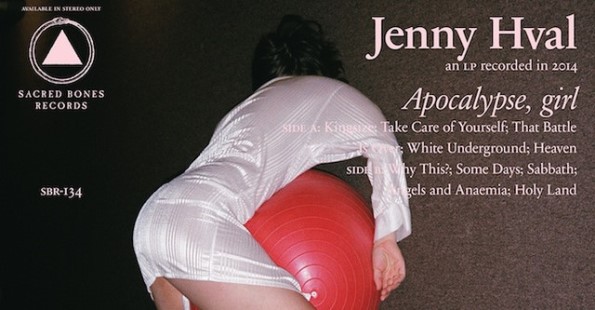
‘Apocalypse, Girl’ by Jenny Hval – Totally disorienting
The world is a tough place. You can’t deny it. At least when you allow Jenny Hval’s ‘Apocalypse, Girl’ to spread its tentacles into your mind – and I did. The artwork features a woman tripping over a space hopper rather clumsily. Face down.
If we may believe Hval, such uncomfortable situations dominate our lives. The pressure not to make a fool out of yourself is unbearable. A phenomenon the Norwegian chanteuse analyses with an almost painful self-awareness.
Championed by Michael Gira
When in September 2014 noise guru Michael Gira (Swans, Angels of Light) agreed to do a brief Q&A session before steamrolling Brussels’ Ancienne Belgique, he turned up at the eleventh hour. Luckily, he picked some interesting music for the eagerly waiting audience.
Not particularly extreme-sounding, the combination of a fairylike female voice and some seriously disturbing words, was surprising. Later on, back home with ears still ringing, buzzing and roaring from Swans, Google told me the singer was Jenny Hval.
Deceivingly innocent
Hval’s writing style is rather, erm, carnal. Involving a small army of cunts and ‘soft dicks’. Mastering a sense of drama likely learned from childhood idol Kate Bush, Hval sets her angelic, deceivingly innocent voice against a spiky musical backdrop. You’ll understand it doesn’t take ages before ‘Apocalypse, Girl’ totally disorients you.
Hardly a melodic piece, opening song Kingsize immediately shows Hval is capable of tremendous mental leaps. In a matter of moments she mentions bananas rotting away in her lap, cupcakes and a “huge capitalist clit”. Ominous strings and spoken word set the tone. And it’s a grim one.
Fierce social commentary
Take Care Of Yourself dissects what people do to keep themselves happy. Which apparently comes down to: meeting the expectations of others (“shaving in all the right places”) and … masturbating. Hval sounds in turns joking, elegiac and unpleasantly disturbed. While synths paint the scene in ever darker tones.
Only after that there’s room for a more or less accessible song: That Battle Is Over. Hval’s voice might sound heavenly, but excells in fierce social commentary. Specifically about the burden on today’s women’s shoulders:
“Statistics and newspapers tell me I am unhappy and dying
That I need man and child to fulfill me
That I’m more likely to get breast cancer
And it’s biology, it’s my own fault.”
Washed up from a wild sea, Heaven takes the tempo to a mild trot. With pounding electronics and strings and harps spiraling around Hval as she climbs to a higher register. But again, her words are arresting: “I never was a girly girl, forgive me”, reveales that it’s damn hard to swim against the tide.
The pains of being a female outsider
The velvety Sabbath is dominated by the feeling that we have zero control at all. Self-doubt is the starting point for Angels and Aenemia, while the lengthy Holy Land culminates in Hval violently gasping for air.
Despite her unfiltered stream of consciousness, Hval’s message is crystal clear: people are constantly judged – even more so being a female outsider. Taking herself as an example, Hval exposes her inner self as few did before.
Stand-out track:
This review is based on a piece I wrote for daMusic.be in Dutch.